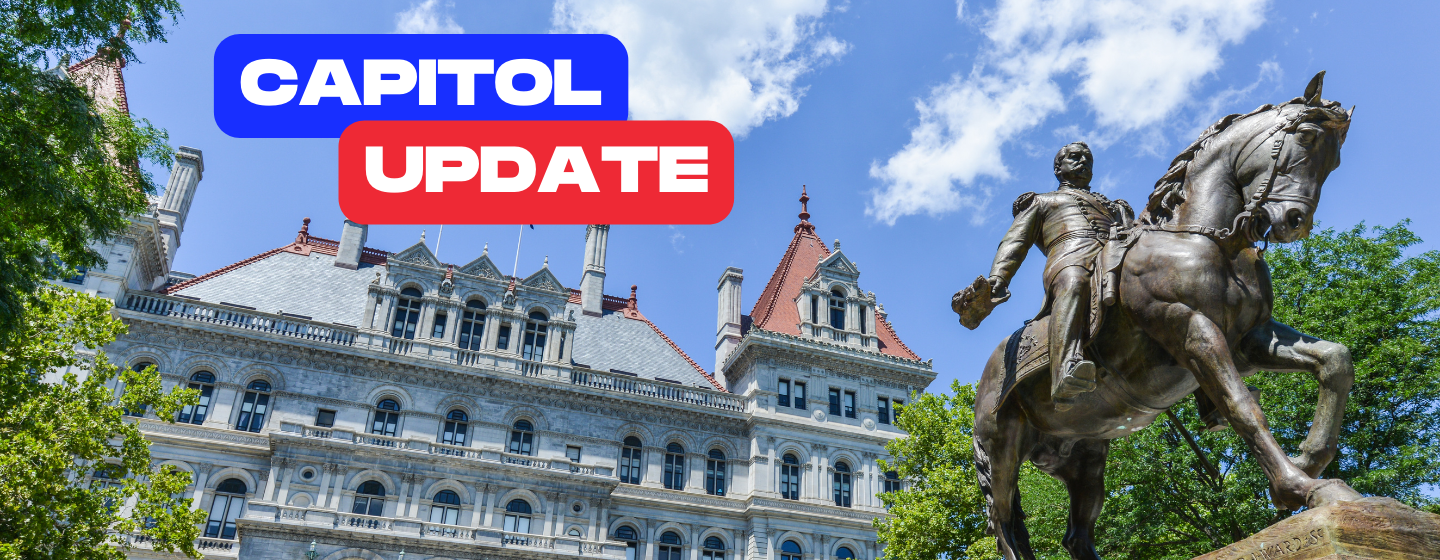Latest News and Polling Results from the State Capitol

Dan Clark: Hearings on Governor Kathy Hochul’s $227 billion budget plan wrapped up this week. That means top lawmakers will now spend the next four weeks negotiating a final state budget with Hochul’s office before it's due at the end of March.
Just like at the federal level, the legislature has to approve the state budget, it doesn't just become law. The budget is mostly about state spending, but as we tell you every year, it's also a chance to force negotiations on hot button issues. That always starts with the governor's agenda, but new polling shows mixed reviews for that agenda with voters and a modest approval rating for Hochul. Siena pollster Steve Greenberg had this to say.
Steve Greenberg: But what's most interesting to me at least, is that for a year and a half as governor, this Democratic governor in a state where 50% of the enrolled voters are Democrats, has never once hit 50% favorability rating.
DC: Now, some of Hochul’s agenda is popular with voters. They seem to like her proposals for tying the minimum wage to inflation and raising taxes on Cigarettes. Hochul wants to raise the state's tax on a pack of cigarettes by a dollar up to $5.35. 62% of registered voters support that according to Siena. Hochul also wants to ban menthol cigarettes and the goal of those changes, according to her, is to get more people to stop smoking.
About 12% of adults in New York smoke cigarettes, according to the State Department of Health. That's lower than the national average of about 15%. There's not a ton of opposition to Hochul’s plan, but convenience store owners are worried it will cut into their profits and for some stores to close. Kent Sopris, President of the New York Association of Convenience Stores says each store could stand to lose about $7,000 on average.
Kent Sopris: There would be jobs lost for sure. Some stores only sell flavored tobacco products, they’re just very popular. If you take them away, those entire stores will close down.
DC: Those store owners argue that consumers will turn to the illicit cigarette market instead of quitting smoking altogether. We'll see if that makes it into the state budget.
However, not all of Hochul’s other ideas are as popular. One issue that's not sitting well with some voters is the state's proposed ban on fossil fuels in new construction that would apply to new, smaller homes starting in 2025 and larger buildings in 2028.
A little more than half of registered voters are against the plan, according to Siena, with 53% opposed. Republicans at the state Capitol are opposed as well. They don't like the plan at all, and they say they won't support a state ban on fossil fuels and new construction on any timeline. Here's what Senate Republican leader Rob Ortt said this week.
Rob Ortt: I would argue we should not be… I don't believe we should be banning natural gas. It is a clean, it is one of the cleanest forms of energy we currently have. It employs tens of thousands, if not hundreds of thousands of people. The job creating factor on the renewable side doesn't come close. Doesn't come close.
DC: A recent report from the US Department of Energy showed a decline in jobs in fossil fuel industries and a rise in jobs in the renewable energy sector in 2021. The most recent data available.
Dan Clark: The State Department of Labor has finalized new overtime rules for farm workers. You will remember that last year a state wage board voted to allow overtime for farm workers after 40 hours with a phase in over the next ten years. Right now, they only earn overtime after 60 hours.
Farm groups have said the change will cut into their revenue and force some farms to shut down. But Democrats pushed back on that argument this week, pointing to a new permanent tax credit for farmers approved last year. Senate Agriculture Chair Michelle Hinchey.
Michelle Hinchey: The tax credit also covers 118% of farmer cost. So, it's more than a dollar for dollar. It's covering unemployment, workers comp, all those kind of superfluous additions to employee cost, this tax credit actually covers. So there really, I'll say should be but, there will be no impact for farmers financially with this tax credit for having to do that over time.
DC: We won't really know the full impact of the new overtime rules or the tax credit for a few years as the phase in begins.
Watch the Interview
Stay informed with the latest updates and polling results from the New York State Capitol.


